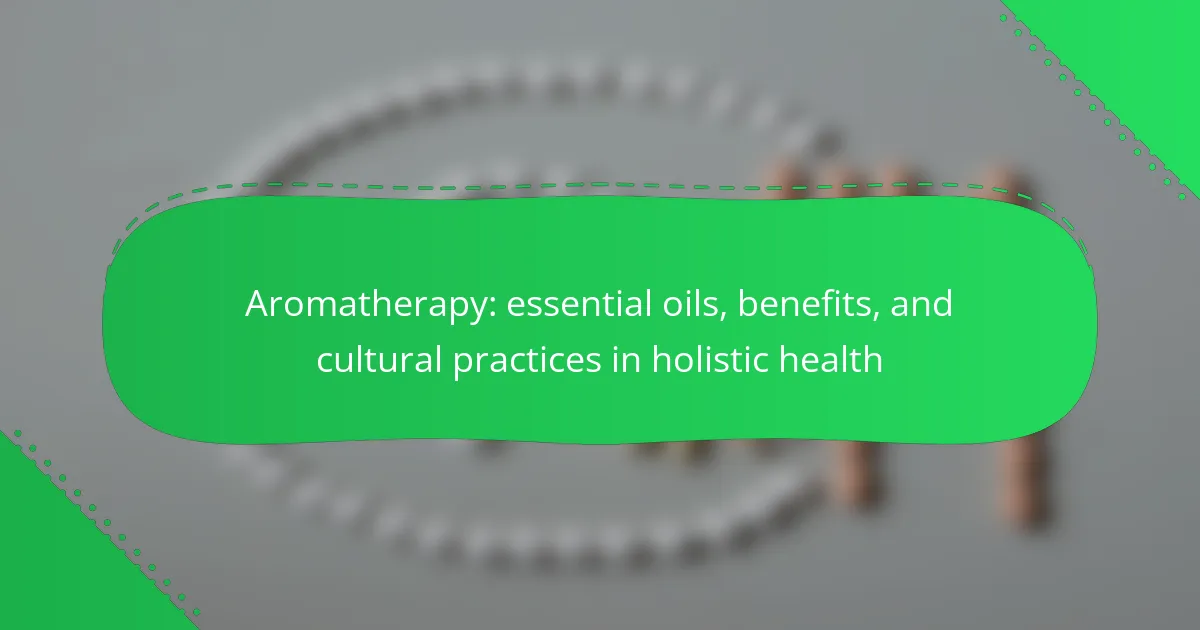Aromatherapy offers significant benefits for physical and emotional well-being through the use of essential oils. This practice promotes relaxation, improves sleep quality, and enhances mood. Cultural variations influence the methods and oils used, highlighting its versatility in holistic health. Understanding essential oil applications and potential challenges is essential for effective integration into daily life.
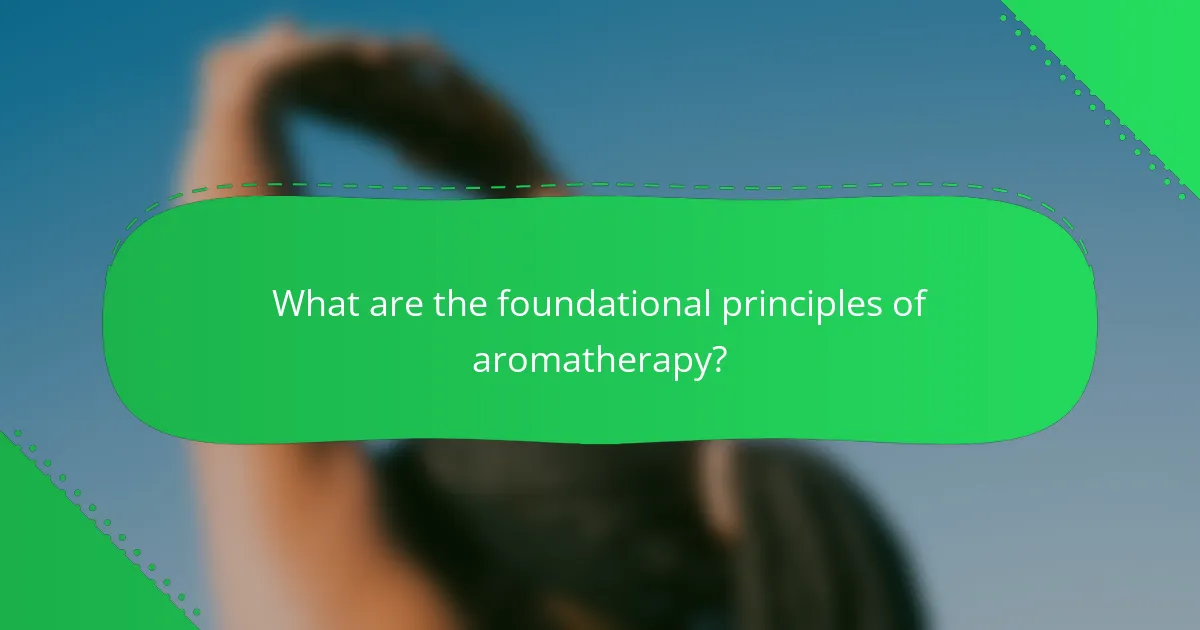
What are the foundational principles of aromatherapy?
The foundational principles of aromatherapy include the use of essential oils to promote physical and emotional well-being. Aromatherapy relies on the therapeutic properties of natural plant extracts. Key principles involve inhalation, topical application, and diffusion to enhance health. Essential oils are chosen based on their unique attributes and benefits, such as relaxation, energy, or immune support. Cultural practices vary globally, influencing the methods and oils used in holistic health approaches.
How do essential oils interact with the body?
Essential oils interact with the body through inhalation and topical application, influencing physical and emotional well-being. When inhaled, aromatic compounds stimulate the olfactory system, triggering responses in the brain that can affect mood and stress levels. Topically, essential oils penetrate the skin, offering benefits such as pain relief and improved circulation.
The unique attributes of specific oils contribute to their effects. For example, lavender is known for its calming properties, while peppermint can invigorate and enhance alertness. Cultural practices in holistic health often incorporate these oils, emphasizing their therapeutic potential in various traditions.
Research supports the efficacy of aromatherapy, highlighting its role in reducing anxiety and promoting relaxation. Studies indicate that certain essential oils can lower cortisol levels, further enhancing their health benefits.
Why is the quality of essential oils important?
The quality of essential oils is crucial for effective aromatherapy. High-quality oils ensure potency and therapeutic benefits, while low-quality oils may lack efficacy and contain harmful additives. Pure essential oils, derived from reputable sources, provide the desired health benefits associated with aromatherapy practices. Quality also influences the aroma, which affects emotional and psychological responses during use.
What methods are used to extract essential oils?
Essential oils are extracted using methods like steam distillation, cold pressing, and solvent extraction. Each method varies in efficiency and quality of oil produced.
Steam distillation is the most common method, utilizing water vapor to separate oils from plant material. Cold pressing is primarily used for citrus oils, extracting oils through mechanical pressure without heat. Solvent extraction is used for delicate flowers, employing chemical solvents to yield a higher quantity of oil, though it may leave residues.
These extraction methods impact the purity and aroma of the essential oils, influencing their application in aromatherapy and holistic health practices.

What are the key benefits of aromatherapy?
Aromatherapy offers numerous benefits, including stress reduction, improved sleep quality, and enhanced mood. Essential oils stimulate the limbic system, promoting relaxation and emotional balance. Research indicates that lavender oil can significantly decrease anxiety levels. Additionally, certain oils have antimicrobial properties, supporting overall health. Aromatherapy practices vary across cultures, integrating holistic health approaches.
How can aromatherapy enhance mental well-being?
Aromatherapy can significantly enhance mental well-being by promoting relaxation and reducing stress. Essential oils like lavender and chamomile are known for their calming properties. Studies indicate that inhaling these oils can lower anxiety levels and improve mood. Furthermore, cultural practices integrating aromatherapy often emphasize mindfulness, which contributes to emotional balance. Regular use of essential oils can lead to improved sleep quality, further supporting mental health.
Which essential oils are most effective for physical health?
Lavender, peppermint, eucalyptus, tea tree, and chamomile essential oils are most effective for physical health. These oils offer various benefits, including pain relief, anti-inflammatory properties, and stress reduction.
Lavender oil is known for its calming effects and can aid in sleep. Peppermint oil helps relieve headaches and digestive issues. Eucalyptus oil is effective for respiratory health, while tea tree oil possesses antimicrobial properties. Chamomile oil is often used for its soothing effects on skin irritations.
These essential oils can be used in diffusers, topical applications, or baths, enhancing overall well-being. Their unique attributes make them valuable in holistic health practices.
What role does aromatherapy play in stress management?
Aromatherapy plays a significant role in stress management by utilizing essential oils to promote relaxation and emotional well-being. The inhalation of specific scents can stimulate brain regions that regulate mood and stress response. For instance, lavender oil is known for its calming effects, while citrus oils can uplift mood. Regular use of aromatherapy can enhance overall mental health, reduce anxiety, and improve sleep quality. Various cultural practices incorporate aromatherapy, emphasizing its holistic approach to health and wellness.
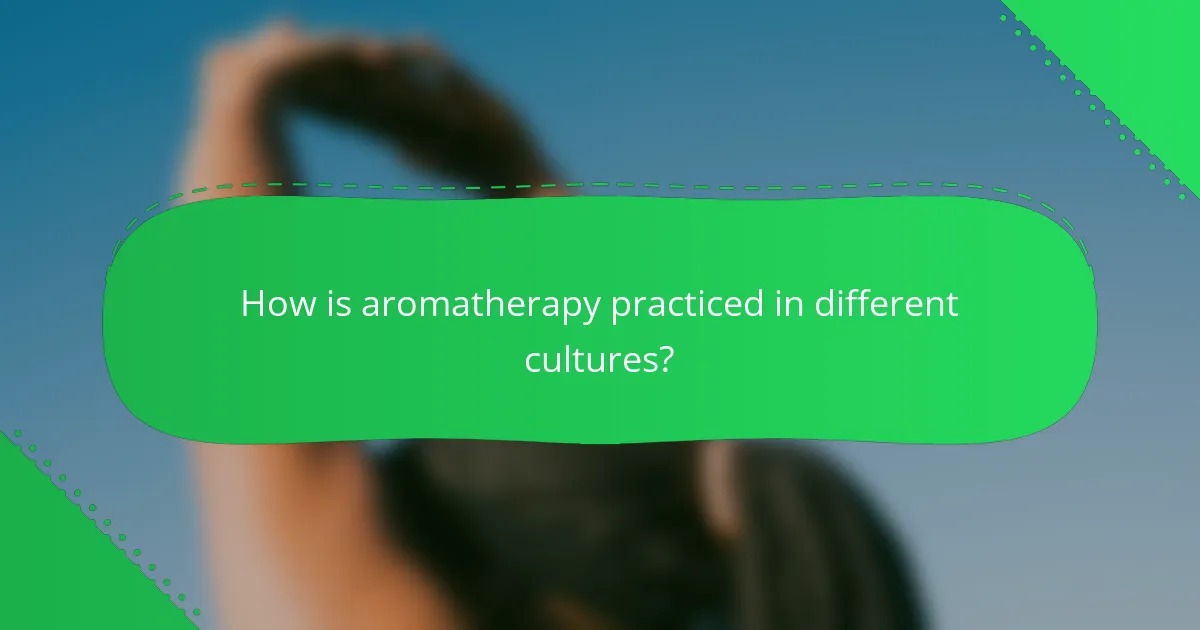
How is aromatherapy practiced in different cultures?
Aromatherapy is practiced differently across various cultures, each emphasizing unique essential oils and techniques. In ancient Egypt, aromatherapy involved the use of oils for religious rituals and embalming. Traditional Chinese medicine incorporates essential oils for balancing energy and promoting wellness. In India, Ayurveda utilizes aromatic herbs for healing and meditation. Meanwhile, in Western cultures, aromatherapy focuses on stress relief and relaxation through diffusing oils. Each culture’s approach highlights specific benefits, showcasing the versatility of aromatherapy in holistic health.
What traditional methods are used in Japanese aromatherapy?
Traditional methods in Japanese aromatherapy include the use of essential oils derived from plants, often combined with techniques like Shinrin-yoku (forest bathing) and traditional incense burning. These practices emphasize holistic health benefits, promoting relaxation and mental clarity. Unique attributes involve the incorporation of seasonal scents and local flora, enhancing the cultural significance of aromatherapy in Japan. Additionally, rare practices such as the use of specific wood types in incense, like agarwood, highlight the depth of traditional knowledge in this field.
How do Western practices differ from Eastern approaches?
Western practices in aromatherapy often emphasize scientific validation and standardized formulations, while Eastern approaches focus on traditional wisdom and holistic integration. Western methods typically prioritize specific essential oils for targeted therapeutic effects, whereas Eastern practices incorporate a broader range of sensory experiences and rituals. For example, Western aromatherapy might use lavender for stress relief, while Eastern traditions may blend multiple oils to enhance overall well-being. This difference highlights the unique attribute of cultural context in shaping health practices, influencing the perception and application of essential oils in holistic health.
Which cultural rituals incorporate aromatherapy?
Aromatherapy is integrated into various cultural rituals worldwide. For example, in traditional Chinese medicine, essential oils are used during acupuncture sessions to enhance relaxation. In Indian Ayurveda, aromatic herbs are employed in rituals to promote spiritual well-being. Native American practices often incorporate smudging with aromatic plants like sage for purification. Additionally, in Japanese culture, incense is burned in ceremonies to create a serene atmosphere. These practices highlight aromatherapy’s role in enhancing holistic health through cultural traditions.
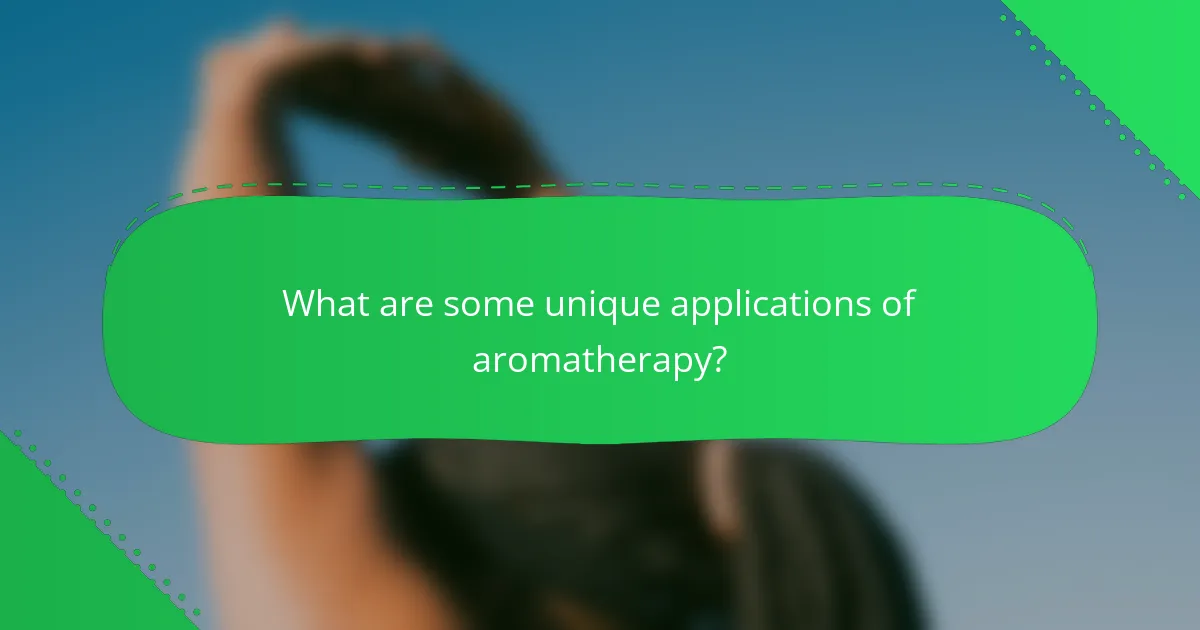
What are some unique applications of aromatherapy?
Aromatherapy has unique applications in stress relief, pain management, and enhancing mental clarity. For example, lavender oil reduces anxiety, while peppermint oil alleviates headaches. Certain essential oils are used in cultural rituals to promote spiritual well-being. Additionally, aromatherapy can improve sleep quality through calming scents.
How is aromatherapy integrated into modern healthcare?
Aromatherapy is increasingly integrated into modern healthcare as a complementary therapy. It enhances patient well-being by reducing anxiety, improving mood, and alleviating pain. Healthcare practitioners utilize essential oils for their therapeutic properties, often in conjunction with conventional treatments. Research indicates that aromatherapy can lead to improved patient outcomes in areas like stress management and pain relief. This integration reflects a growing recognition of holistic health practices in medical settings.
What innovative products are emerging in the aromatherapy market?
Innovative products in the aromatherapy market include smart diffusers, essential oil blends for specific moods, and personalized scent experiences. Smart diffusers connect to apps, allowing users to control settings remotely. Blends target anxiety, sleep, or focus, enhancing therapeutic effects. Personalized scent experiences use AI to tailor aromas based on individual preferences, promoting well-being. These advancements reflect a growing trend towards integrating technology with holistic health practices.
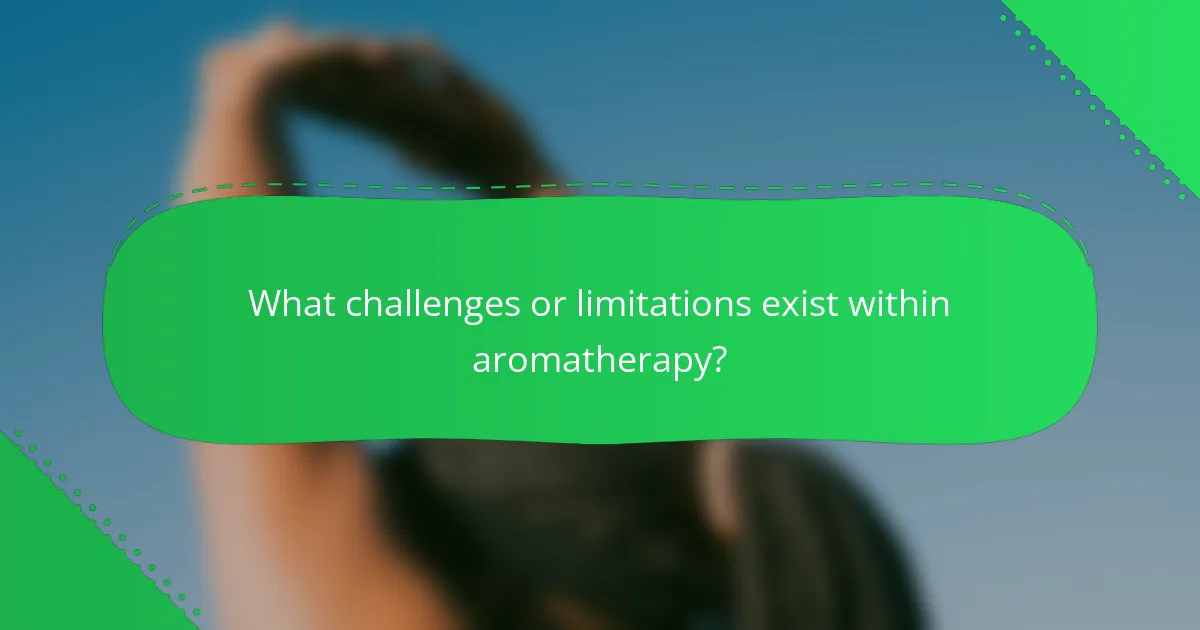
What challenges or limitations exist within aromatherapy?
Aromatherapy faces several challenges and limitations, including variability in essential oil quality, lack of scientific validation, and potential allergic reactions. Essential oils differ in purity and potency, impacting effectiveness. Research supporting aromatherapy’s benefits is limited, often relying on anecdotal evidence. Some individuals may experience adverse effects, such as skin irritation or respiratory issues, highlighting the need for caution.
How can individuals ensure safe use of essential oils?
Individuals can ensure safe use of essential oils by following specific guidelines. First, always dilute essential oils with a carrier oil before topical application to prevent skin irritation. Second, conduct a patch test on a small skin area to check for allergic reactions. Third, avoid ingestion of essential oils unless under professional guidance. Fourth, ensure proper ventilation when using oils in diffusers to prevent overwhelming scents. Lastly, store essential oils in a cool, dark place to maintain their potency and safety.
What misconceptions about aromatherapy should be addressed?
Common misconceptions about aromatherapy include the belief that it is only about pleasant scents and that it lacks scientific backing. Many people think essential oils are solely for relaxation, overlooking their potential therapeutic benefits. Others assume all oils are safe for everyone, ignoring possible allergies or interactions. Additionally, some believe aromatherapy can replace conventional medicine, which is misleading; it should complement, not substitute, professional healthcare. Lastly, the effectiveness of aromatherapy is often dismissed as placebo, despite growing evidence supporting its benefits in stress relief and emotional well-being.

What are the best practices for incorporating aromatherapy into daily life?
Incorporating aromatherapy into daily life involves intentional practices that enhance well-being. Start by selecting essential oils that suit your needs, such as lavender for relaxation or peppermint for energy.
1. Diffuse essential oils in your living space to create a calming atmosphere.
2. Add a few drops of oil to a warm bath for a soothing experience.
3. Use oils in massage to promote relaxation and relieve tension.
4. Create personal inhalers for on-the-go aromatherapy benefits.
5. Incorporate oils into skincare routines for their therapeutic properties.
Regularly integrating these practices can lead to improved mood and overall health.
How can individuals create a personalized aromatherapy routine?
Individuals can create a personalized aromatherapy routine by selecting essential oils that resonate with their needs. Start by identifying specific goals, such as relaxation or energy boost. Choose oils like lavender for calming effects or citrus for uplifting moods. Next, determine the method of use, whether through diffusing, topical application, or inhalation. It’s essential to consider personal preferences and any allergies. Finally, establish a consistent schedule for use, integrating aromatherapy into daily rituals. This tailored approach enhances the benefits of aromatherapy in holistic health.
What tips do experts recommend for maximizing benefits?
To maximize benefits from aromatherapy, experts recommend selecting high-quality essential oils, using proper dilution, and practicing mindfulness during sessions. Incorporating specific oils for targeted effects enhances the experience.
1. Choose pure, organic oils to ensure safety and efficacy.
2. Dilute oils appropriately with carrier oils to prevent skin irritation.
3. Use methods like diffusion or inhalation to optimize absorption.
4. Create a calming environment to enhance relaxation and mental clarity.
5. Tailor oil selection to individual needs, such as stress relief or energy boosting.
6. Regularly evaluate personal responses to different oils for optimal results.
